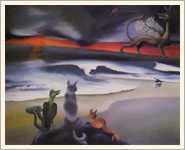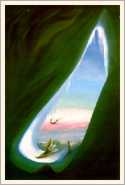c h r o n o l o g y - S te l l a S n e a d - p a r t t w o
| 1987 | In this year, two unexpected events happened connected with
my long-neglected painting. One day, while working in the darkroom, a curtained-off part
of my New York apartment, an idea popped up and spread: Why not find out if I can still
paint? I tried, and I could. As I had no particular notion of what I wanted to paint, I
chose one of my photo-collages and did a variation on it. The paint went on easily; I completed it in four mornings. Although I was not thoroughly pleased
with the result ¾ I preferred the photo-collage¾ I was back with painting; or so it seemed.  12-inches square; two were versions of a
friend’s dreams, not very successful, either. There followed two more versions of
photo-collages done in the ’70s. Their titles: “With An Eye To The Horizon”
(there were two of the latter, or, if you like, two of them at different levels), and
“Tilting the Horizon.” A series based on geographical concepts might be
interesting, I thought and hoped; but it petered out. Fortunately, through the ’80s
my photography was more or less flourishing, so that the gaps and disappointments with
painting were not too severe. 12-inches square; two were versions of a
friend’s dreams, not very successful, either. There followed two more versions of
photo-collages done in the ’70s. Their titles: “With An Eye To The Horizon”
(there were two of the latter, or, if you like, two of them at different levels), and
“Tilting the Horizon.” A series based on geographical concepts might be
interesting, I thought and hoped; but it petered out. Fortunately, through the ’80s
my photography was more or less flourishing, so that the gaps and disappointments with
painting were not too severe. |
| mid-’50s | To go back, briefly, to the mid-’50s, when my photographic activities began to take off: I was so absorbed in research and travel to far places, and when at home learning to print and doing my own darkroom work, that I paid little attention to the whereabouts of my paintings. Some were lent to friends from the late ’40s onwards in Taos; one, “Tiger In The Sky,” was bought by my gallery there (for a song); in the ’60s, “Rigidity and Mirth” was given away, as was “The Red Mesa,” which I took to India in 1952. There were several others I had taken to India, as I had lived there from 1960 to 1971. |
| 1971 | On returning from India to live in New York, I brought back all the paintings I had taken, except for one, “Rio Grande,” which was damaged beyond repair when it fell off the wall. I settled, in 1971, in an apartment on the Upper West Side of Manhattan, just behind Lincoln Center, and am still there, making this the place by far the longest of any I have lived in my whole life. Although still much occupied with photography and with photographic books, articles and exhibitions, I began to take stock of my paintings. It became clear that I had lost track of a good many. There were those lent to friends, who had since died while I was on the other side of the world, and when I came back it was impossible to trace them. The largest of them still hung on my mother’s wall; after she died, in 1956, I was preparing to leave on my overland journey from Istanbul to India, and I shamelessly let the paintings go with the furniture. I am at a loss to explain this indifference and neglect. From the early ’70s, except for the six or eight I kept beside me in New York and sometimes hung, the rest were stored in a friend’s garage in London. I continued to be careless, never even making a list, and having this so-called friend sign it. So when in the ’80s I discovered many were missing, he chose to insist I had already removed them. The only redeeming feature was that, while living in Taos, in the late ’40s, where most of my work was done, black-and-white photos were taken of them. From these I could tell that at least a dozen were stolen. Some time elapsed until a friend, on seeing these photographs, had the bright idea that, with their help, I might be able to paint “variations” on those stolen. I went happily, and I think fairly successfully, into this from the beginning of the ’90s. |
| 1980 | Color was freely chosen, and they probably looked fresher than the originals; but somehow it was satisfying work, and I was pleased to have the variations as company once again. I sometimes wondered what I would say or do if I suddenly came face to face with one of the originals, but none have ever come to light— never a trace. |
| 1987 | Curiously, it was also in 1987 that I heard that two of my
paintings had been spotted on the London art market, priced at £4,000 each, but which
ones, I could never discover. Very possibly it was false rumor. In 1987 there was a group
show entitled “Cats” at the Louise Hallett Gallery in Bayswater, where my
“Woman With Cats” was shown. (Please see year 1946,
in Part 1 of this chronology for quote in the catalog.) This catalogue was given me in
1994, when I visited the aforementioned young man who now owns “Woman With Cats”
and “Rigidity and Mirth” (sometimes referred to as “Dark Continent”).
I was unable to find the
gallery or the whereabouts of Louise Hallett. Any such information would be most welcome.
|
| Aldrich Museum Ridegfield, Ct. | In all the years since 1950, only one other of my paintings has been shown publicly. This was in a large group show arranged by Robert Metzger at the Aldrich Museum, Ridgefield, Connecticut, December 1985. It was called “A Second Talent.” It concerned artists who had started as painters and become photographers, or the other way round. I showed “The Plaza,” an oil done in New Mexico in 1948, together with a photo-collage and two photographs from my India collection. There were big names in the show: David Hockney, Rauschenberg, Samaras, Barbara Morgan, Cadmus, Ellsworth Kelly, Gyorgy Kepes, director of Advanced Visual Studies at M.I.T. No particular notice taken of me, but I thought my piece of wall looked good. |
| 1998 | Still, I failed to get even a toe in the door of the New York art world or among the surrealists. I simply did not know how to manage my career. In 1998, I had turned 88 and time was running out to be rediscovered as a painter. Quite suddenly the doors were flung open, and there was Neil Zukerman wanting to do just that! A solo exhibition in April 1999; a handsome catalogue; enthusiasm, encouragement, kindness, reliability, generosity. What lovely luck! |
![]()
PAINTINGS by Stella Snead:
Gallery 1:
Begonias 1936
The Sulky Lion 1943
Ecstatic Cow 1943
Smothered City 1943
Arrival of a New Planet 1944
Advancing Monuments 1946
Gallery 2:
Tornado 1946
The Plaza 1947
Animal Totems 1947
Animal Kingdom 1948
Crisis Birds 1950
Depression Center 1950
Stopped painting 1950
Turned to photography 1956-7
Restarted painting 1987 -- approx. 35-yr. block
Gallery 3:
Stupa Yell 1987
Caldera 1987 (not shown)
Celia’s Voyage 1987 (not shown)
Tilting the Horizon 1987
The Land at Sea 1987
With an Eye to Horizons 1988/alterations 1994
Deep Shell 1989
Snake Tongue Pier 1989
Nearly stopped painting again around 1990
Starting doing Variations on Stolen or Lost Paintings
Gallery 4:
Ritual -- original, late 40s, Variation 1992
Planetary Figure Orig 1944, Variation 1992
Grasslands Orig. 1944, Variation 1992
Black Mesa Orig. 1948, Variation 1992
Sandstorm Orig. 1949, Variation 1993
Ladies from Afar Orig. 1949, Variation 1993, 1994
Gallery 5:
Bird Sanctuary Orig. 1948 Variation 1994
Section of a Labyrinth Orig. 1949, Variation 1994
Cat by Ghost Light late 40s, variation 1994 -- no slide
Signals from the Grotto -- new, 1995
BOOKS by Stella Snead: Photography:
CAN DROWNING BE FUN? A Nonsense Book. New York: Pont la Vue Press, 1992
ANIMALS IN FOUR WORLDS: Sculptures from India. texts, Wendy Donager and George Mitchell. Chicago: University of Chicago Press, 1989
BEACH PATTERNS. Barre, Ma.: Barre Pub./Clarkson Potter/Crown, 1975
SHIVA’S PIGEONS. Texts by Rumer Godden and Jon Godden. London: Chatto & Windus/New York: The Viking Press, 1992
CHILDREN OF INDIA. New York: Lothrop, Lee & Shephard, 1971
THE TALKATIVE BEASTS. New York: Lothrop, Lee & Shephard, 1969
SEVEN SEVEN. New York: Folder Editions, 1965
RUINS IN JUNGLES. London: Hamish Hamilton, 1962
WORKS by Stella Snead in Other Peoples’ Books:
INTIMATE RELATIONS: EXPLORING INDIAN SEXUALITY. Sudir Kakar. Chicago: U. of Chicago Press, 1990 (cover photo)
THE PLACE OF THE HIDDEN MOON. Edward Dimrock. Chicago: U. of Chicago Press, 1989 (cover photo)
LUCIE RIE. Tony Birks. Sherborne, Dorset (Eng.): Alphabooks, 1987
ISLAMIC HERITAGE OF THE DECCAN. ed. George Mitchell. Bombay: Marg Publication
VILLAGE INDIA. Stephen Huyler. New York: Abrams, 1985 (25 photos)
ADIDI. Catalog. Washington, D.C.: Smithsonian Institution Press, 1985
INDIA: ANCIENT LAND, NEW NATION. Amitra Sarin. Dillon Press. (S.S.: cover and 23 photos)
WAYS TO SHIVA. Joseph Dye. Philadelphia: Phila. Museum of Art, 1981
NATURE IN THE CITY. New York: Viking, 1972
MAGIC OF THE SEA. New York: Viking, 1971
THE WONDERFUL WORLD OF THE SEA. London: Aldus Books, 1970
SELECTED (Other) Publications:
“Early Cabbage” A spoof with photographs. ARCHIPELAGO Vol. 1, No. 3
“REDISCOVERY” The Paintings of Stella Snead, with text by Stella Snead.
Contributions by Whitney Chadwick, Salomon Grimberg, Stephen Robeson-Miller, Pavel Zoubok, Neil Zukerman. New York: CFM Gallery
